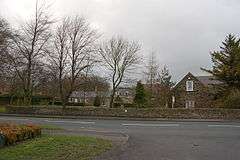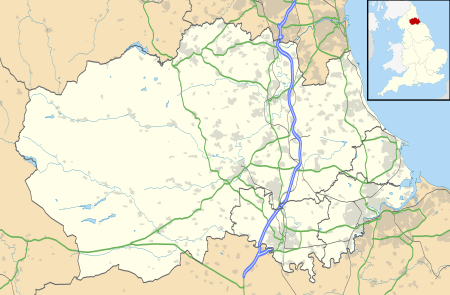Medomsley
Medomsley is a village in County Durham, England, about 2 miles (3 km) northeast of the centre of Consett, 1 1⁄2 miles (2 km) south of Hamsterley and 1 mile (2 km) southeast of Ebchester.
| Medomsley | |
|---|---|
 Cottages in the village | |
 Medomsley Location within County Durham | |
| OS grid reference | NZ1254 |
| Civil parish |
|
| Unitary authority | |
| Ceremonial county | |
| Region | |
| Country | England |
| Sovereign state | United Kingdom |
| Post town | Consett |
| Postcode district | DH8 |
| Police | Durham |
| Fire | County Durham and Darlington |
| Ambulance | North East |
| UK Parliament | |
Medomsley is about 778 feet (237 m) above sea level, atop a hill overlooking the Derwent Valley. The village has views of the Pennines and the surrounding countryside for miles around.
Toponym
The Boldon Book of 1183 records Medomsley as Medomesley. The Vita S Godrici, written in 1190, records it as Madmeslei.[1] The placename is derived from Old English and may mean the “middlemost clearing” or “Maethhelm’s clearing”.[2]
Parish church
The Church of England parish church of St Mary Magdalene is a sandstone building completed in the 13th century. In 1878 it was restored to designs by the architects HJ Austin, RJ Johnson and WS Hicks, who added a new roof, chancel screen (designed by Hicks) and north aisle. It is a Grade I listed building.[3]
Medomsley's church served many inhabitants of Shotley Bridge for baptisms, marriages and burials until the creation of Shotley Bridge parish in the 19th century. The sword-makers of Shotley Bridge were frequent visitors of the church, and the parish registers record many of these events.
Notable people
The antiquarian and physician Christopher Hunter (1675–1757) was born at Medomsley Hall.[4][5]
Coal mining
There were two collieries near the village: Medomsley Colliery southwest of the village and Derwent Colliery immediately to the north. Medomsley Colliery was opened in 1839.[6] It was also known as the Busty pit, and is not to be confused with South Medomsley Colliery near Annfield Plain. Derwent Colliery was opened in 1856.[7]
Both pits were opened by Edward Richardson and Co. The Consett Iron Company took them over in the 1860s. They were nationalised in 1947.
Coal left the two pits by rail. A 2-mile (3 km) freight-only railway ran south from Derwent Colliery via Medomsley Colliery to a junction west of Leadgate, where it joined the Stanhope and Tyne line of the North Eastern Railway.[8]
There were several mining accidents at the pits. One in 1923 killed eight miners.[9] In 1957, in another accident, two miners were rescued uninjured.[10]
The National Coal Board closed Derwent Colliery in 1964 and Medomsley Colliery in 1972. It proposed opencast coal mining near Medomsley, but in 1976 the Secretary of State for Energy, Tony Benn, rejected the proposal.[11]
Amenities
Scheduled bus services link Medomsley with Consett and Newcastle upon Tyne.
Medomsley has a cricket club, at High Westwood, that was founded in 1926.
Youth detention centres
Hassockfield youth detention centre is on a 33 acres (13 ha) site on the edge of Medomsley.
Medomsley Detention Centre
The site was previously Medomsley Detention Centre, where some staff sexually and physically abused thousands of boys in the 1970s and 80s.[12][13][14] In 1988 the centre closed after the scandal of the paedophile officer Neville Husband.[15]
Hassockfield detention centre
The centre was re-opened in 1999. In 2004 Adam Rickwood, a resident of Hassockfield, committed suicide.[16] After this incident Hassockfield improved its performance, but it was closed again in 2015.
References
- Ekwall 1960, Medomsley.
- Watts 2002, Medomsley.
- Historic England. "Church of St Mary Magdalene (Grade I) (1240478)". National Heritage List for England. Retrieved 1 December 2017.
- "Dictionary of National Biography". London: Oxford University Press. Retrieved 18 May 2013.
- Surtees 1820, pp. 284–297.
- "Medomsley Colliery". Durham Mining Museum. Retrieved 28 May 2013.
- "Derwent Colliery". Durham Mining Museum. Retrieved 28 May 2013.
- "One-Inch Map of Great Britain" (Map). Hexham (1947–52 ed.). 1:63,360. Seventh Series. Chessington: Ordnance Survey. 1956. § Sheet 77.
- "`". The Times. London. 26 February 1923. p. 12.
- "`". The Times. London. 20 June 1957. p. 4.
- "`". The Times. London. 26 February 1976. p. 3.
- "Medomsley: Prison officers who subjected vulnerable teenagers to daily abuse at detention centre jailed". Northern Echo. 4 April 2019. Archived from the original on 5 April 2019.
- Allison, Eric (13 April 2012). "A true horror story: The abuse of teenage boys in a detention centre". The Guardian. Guardian Media Group. Retrieved 16 April 2012.
- H M Chief Inspector of Prisons (1986). Report on HM Detention Centre Medomsley. London: Home Office.
- "Medomsley detention centre saw hundreds sexually abused". BBC News. 12 March 2019. Retrieved 12 March 2019.
- "Unlawful force contributed to death of boy, 14, in cell". BBC News. 27 January 2011. Retrieved 12 March 2019.
Bibliography
- Ekwall, Eilert (1960) [1936]. Concise Oxford Dictionary of English Place-Names (4th ed.). Oxford: Oxford University Press. Medomsley. ISBN 0198691033.CS1 maint: ref=harv (link)
- Pevsner, Nikolaus; Williamson, Elizabeth (revision) (1983) [1953]. County Durham. The Buildings of England (2nd ed.). Harmondsworth: Penguin Books. pp. 362–363. ISBN 0-14-071009-4.CS1 maint: ref=harv (link)
- Surtees, Robert (1820). "Chapelry of Medomsley". The History and Antiquities of the County Palatine of Durham. 2: Chester ward. London: Nichols & Son. pp. 284–297.CS1 maint: ref=harv (link)
- Watts, Victor (2002). A dictionary of County Durham place-names. Nottingham: English Place-Name Society. Medomsley. ISBN 0904889653.CS1 maint: ref=harv (link)
External links
| Wikimedia Commons has media related to Medomsley. |
- "Medomsley". GENUKI.
- Map sources for Medomsley